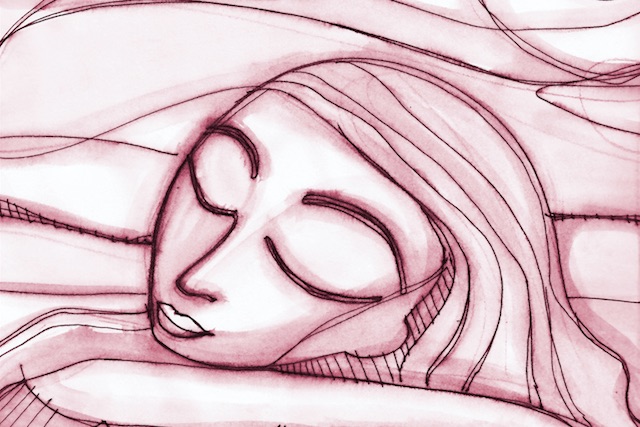
“Rest is not idleness, and to lie sometimes on the grass under trees on a summer’s day, listening to the murmur of the water, or watching the clouds float across the sky, is by no means a waste of time.” ~John Lubbock
Do you ever fear taking breaks?
Maybe you think that if you stop working, everything is going to come crashing down?
Sometimes it feels like you’re riding a train of momentum, and if you try to stop or slow down you’re just going to come off the tracks.
I know the feeling. Believe me, I used to feel the same.
I wanted so badly to achieve everything I could, and would beat myself up if I didn’t. Coffee would fuel my mornings, deadlines and adrenaline my afternoons.
At the time I wasn’t completely oblivious to the problems with my lifestyle. No matter how tired I would get, I still wasn’t sleeping well, and I’d often spend weekends thinking about work.
I could be out at lunch on a Sunday, only half engaged in a conversation with friends because I was already mentally rehearsing Monday.
I knew that I was always just a little bit too stressed. And to make it worse, I was confused, caught between the fear of slowing down and the fear of allowing stress to damage my health.
The problem is, it already was. I started getting headaches at work and waking up with chronic tension in my neck and my back. At a certain point I realised it just wasn’t worth it.
Finally I decided it was time to do something.
So I read a few books on how to better manage my energy. Once I started learning about how important breaks were to my body, mind, and well-being, I began to start taking them seriously. And I noticed something strange—I was becoming more and more productive and I had less stress.
So today I want to tell you something, and I really want you to listen.
You need a rest.
I know what your brain is telling you. How will the kids get to school? How will the bills get paid? I have three to-do lists—and that’s just this morning. How on earth am I going to find time to rest?!
Fortunately, short rests can become a part of anyone’s lifestyle, no matter how busy they are. And the truth is that if you don’t rest, you’ll never feel like your body is recharging properly.
You might collapse at the end of the day and fall into a deep sleep every once in a while, but that feeling of being refreshed and ready to take on the day when you wake up just won’t be there.
So Why Is Rest Important?
Our modern idea of success is to work longer and longer hours until we crash. Companies who praise the ‘hardest workers’ fuel this. It sets a precedent where everyone gives all their energy, but very little of their best work.
The result is that we have a society where rest is considered to be a reward, or even worse, indulgent. But this is not the case at all; rest is a cornerstone of a healthy, happy, and productive life. In fact, rest throughout the day is as important as food, water, and sleep.
Getting in Tune with Our Natural Rhythms
In the mid-twentieth century physiologist Nathan Kleitman discovered that our energy levels rise and fall in ninety-minute sleep cycles. What isn’t as widely known, though, is that he also found that we have ninety-minute wake cycles.
These are called our ultradian rhythms, and if we don’t take proper rests to manage our arousal, we end up less creative, our stress hormones stay elevated, and our dopamine levels can get out of balance—leading to mental illness.
What happens with most people is that as their focus starts to wane, they continue to push themselves to work. In the process they start to draw from their reserves of adrenaline and cortisol to get through the fatigue and maintain enough arousal to work. While some release of these stress hormones is natural, if you don’t rest enough to allow your body to balance them you’ll end up fatigued and unproductive.
So what you need to do is make sure you take mindful, non-work related breaks, at least every ninety minutes.
Here are some ways to make sure you take effective rests throughout your day.
Take decent size rests.
Rests should be at least five to fifteen minutes long. They should also include an activity that is completely detached from work or technology.
Some effective ways to rest are through mindfulness practices, deep breathing, yoga, light walks, or exercise. Creative activities are also a good way to clear your mind, such as sketching, free-writing, or journaling.
Add it to your calendar.
Treat your commitment to rest with as much respect as you would any other daily task. Put the restful activity in your schedule or to-do list and try to find an accountability partner to make sure you stick to them.
Time your work.
If you can time your work and follow the natural cycles of your body you’ll immediately see a huge improvement in how you feel. Try to stick to the advice above and do no more than ninety minutes of straight work without a break.
Get to know yourself.
We all have certain periods during the day in which we experience dips in our concentration. For a lot of us it is between 2 and 4pm. This is a great opportunity to take a slightly longer rest, such as a short nap, if the option is available.
Remember, rest isn’t an excuse to work less, it’s a natural method to help you work better, and more importantly, feel better!

Leave a Reply